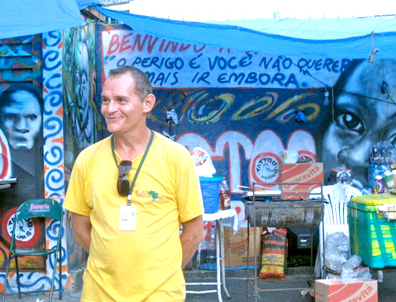
Rocinha, literally meaning "little ranch", has grown from a community of small farms to the largest favela in Brazil, housing over 250,000 people. Wet clothes, vines, and shirtless men hang out of windows. Beer costs a buck. Pharmacies, grocery stores, and butchers are open 24 hours. Labyrinth stairways and cobwebs of TV cables twist around the lampposts and the apartment walls that are lodged into this steep hillside. I’m trying not to miss a beat in the rhythm of motorcycle traffic, blaring music, and squaking chickens. After spending days strolling in the tranquility of Ipanema, it's a relieving change of pace.
Nildo, my guide, admits that he sometimes gets lost in the windy alleyways and he's from here. I found him through Favela Tourism Workshop, a group that trains youth from Rocinha to be tour guides and helps them receive their guide certification from the department of tourism. Nildo is short, speaks rapid-fire English, and is great at metaphors. "You know the horse that just sits and lets flies gather all around him but doesn't do anything to swat them away?" he said. "Well, that's how the police were when they were here." As I and the other tour participants follow his lead through Rocinha, Nildo satisfies our questions about corruption, about violence, about gangs, and about City of God versus reality. But the purpose of his tour is to walk us past the stigma of Latin America’s largest slum and introduce us to, well, the neighborhood.
The way to Rocinha is over a pedestrian ramp. While standing over the freeway our attention is directed to a blinding white building under construction. It's a new community center, part of a federal initiative to "clean up" the favelas, along with more motorcycle taxis, a surf school, a hostel for international volunteers, "pacific" police, and a new hospital. Nildo is excited about these changes, but he’s more enthused to introduce us to the people who are from the favela and, as he says, taking care of their own.
We meet Uncle Lino, whose organization Trade a Gun for a Paintbrush provides kids struggling with drug addictions with a safe place to get creative using recyclable material. Uncle Lino has a big tired smile and he proudly tells us that twenty-five of the 50 youth he’s worked with have gone to college. The paper mache model cities and photo collages are testament to his twenty-five victories. The three 10-year old boys sitting across the street, eyes glazed and hitting a joint like they’ve been doing it for years, are the other half of the challenge.
We walk into the only free kindergarten in the neighborhood, built by the government, sustained by several philanthropists and a few women who we meet sitting behind their sewing machines and needles. In 1983, Senhora Teresa started a co-op downstairs where unemployed parents can come learn a craft. The room is filled with purses made with aluminum can tabs, patchwork clothing, and woven baskets. They end up in stores in Rio, France, and Japan. A woman grabs a flashy jacket and winks at me as she tells me that an Israeli designer took one just like this across the world. Proceeds go to the school.
On the way out Nildo takes us through the market, where I croon over the cheap jeans and havaianas. “Things are cheaper here,” he said. “Food too, and the food is better.” I’m disappointed that I didn’t get to try whatever’s frying next to us. We end up at the bottom of the hill and I ask Nildo to strike a pose in front of a mural. Behind him reads, "Welcome to Rocinha. The only danger here is that you’ll never want to leave."
To take a tour visit: www.favelatourismworkshop.com. Nildo also does private tours in the evenings, reach him at starnuil2004@yahoo.com.br
